Stalin Revived and Admired in Russia
Positive attitudes toward the deceased, former Soviet dictator are at a record high
Stalin Revived and Admired in Russia
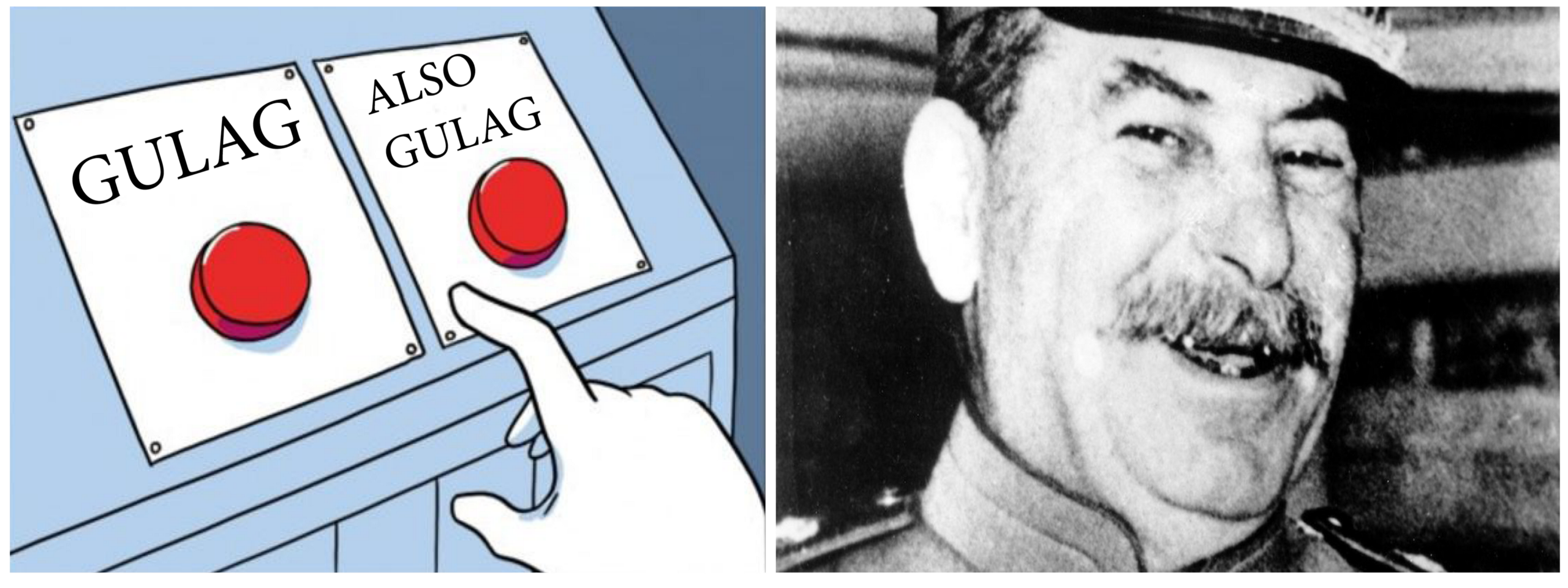
BANNER: (Source:@EtoBuziashvili/DFRLab via The Moscow Times)
Former Soviet dictator Joseph Stalin received a renewed uptick of popularity ahead of this year’s Victory Day celebrations on May 9, a day celebrated in some former Soviet countries marking the anniversary of the surrender of the Nazis to the Allied Forces in 1945.
A record 70 percent of Russians hold a favorable view of Stalin and his policies and methods, according to the latest Levada Center polls published on April 16, 2019. Under Stalin’s rule, millions of Soviet citizens suffered mass arrests, deportations, starvation, and executions at the hands of the regime.
Since coming to power in the early 2000s, Russian President Vladimir Putin has led the charge in building a cult of personality around Stalin, whom he appears to view as an ideological lodestar for post-Soviet Russia. During his presidency, Putin has referred to Stalin as an “effective manager” and directed the replacement of the Russian national anthem with an adapted version of the USSR anthem. Furthermore, various symbols of Stalin can be found across the country, including monuments, souvenirs, and even a church icon. Movies glorifying Stalin are well-received in Russia, while those ridiculing him are lambasted. In 2018, for example, the Ministry of Culture banned the 2017 political satire movie “The Death of Stalin,” labeling it “part of a Western plot to destabilize the country.”
In April 2019, Kremlin media renewed its efforts to draw parallels between Stalin and Putin. Citing polling research, several media outlets justified both leaders’ authoritarian leadership style, suggesting that it served a greater purpose and ultimately achieved “greater goals.”
Admiration, Respect, and Sympathy
On April 16, 2019, the Levada Center, an independent Russian polling and sociological research organization, released a poll indicating that a record 70 percent of the Russian population approved of Stalin and assessed his rule as positive for the country. A similar poll in 2016 showed the Soviet leader’s approval rating at 54 percent. In 2016, the Kremlin listed the Levada Center as a foreign agent because it receives funding from foreign sources, while the EU’s East Stratcom Task Force referred to it as “independent” in 2018.

A separate question asked respondents to describe their feelings toward the Soviet dictator using predefined descriptors, ranging from positive to negative. Just over half of respondents — 51 percent — expressed “admiration,” “sympathy,” or “respect” for Stalin, while the remaining respondents were mixed, negative, or of no opinion.

Many respondents — 46 percent — also concluded that the “human casualties experienced by the Soviet people during the Stalin era” were justified entirely or in part, in service of the regime’s “great goals and the results achieved in a short period of time.”

Putin Scores Higher than a Mass Murderer — Just Barely
Following the release of the Levada Center poll results, Russian state-owned TV broadcaster Россия 1(Russia 1) dedicated a segment of its news broadcast to positive coverage of Stalin. Television host Dmitry Kiselyov, the Director General of Kremlin-funded Ria Novosti known to be one of the Kremlin’s most vehement propagandists, said that formulating survey questions about the respondents’ attitudes toward Stalin as “good” or “bad” was incorrect. Kiselyov enthusiastically suggested that Russia follow a Chinese Communist Party model of “measuring” public opinion toward political leaders by merely dictating what the results were without actually polling the public at large. According to Kiselyov, after Mao Zedong’s death, the Communist Party of China decided to label Mao’s performance as 70 percent positive and 30 percent negative, keeping his image on banknotes and on the outside wall of the Forbidden Palace in Tiananmen Square, Beijing.
Kiselyov cited a poll by Russian state media outlet Ria.ru, highlighting the question, “What is the ratio of good/bad in the measures pursued by Stalin?” The answer “80%/20%,” which indicated the belief that Stalin’s performance was 80 percent “good” and 20 percent “bad,” received the highest result. There were no options in the poll to indicate that Stalin’s performance was primarily bad, with the lowest good/highest bad option being 70:30.
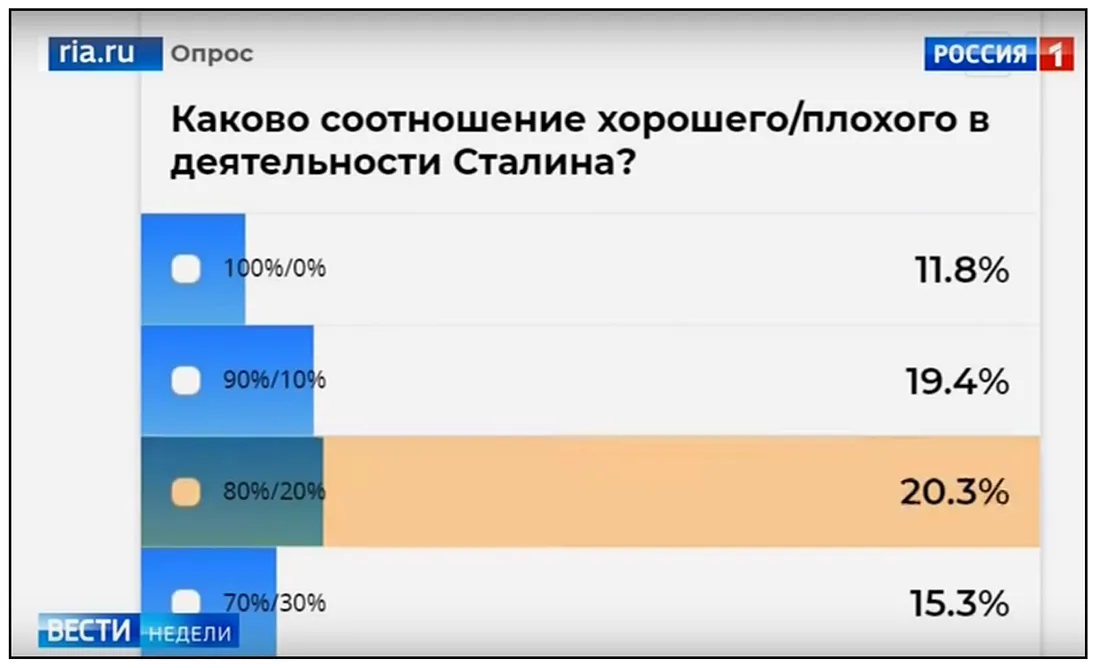
After discussing Stalin’s “ratings,” Kiselyov listed what he considered to be the dictator’s greatest achievements — victory over Nazi Germany, reconstructing the country after the war, and developing the economy — and concluded “there are no ideal leaders in history, as all of them were the sum of advantages and disadvantages.” Kiselyov then shared a poll from the Kremlin-run Russian Public Opinion Center (VTsIOM) in which respondents rated Putin a more effective leader than Stalin. In response to the question “Under whose leadership was the country developing in the right direction?” 72 percent of respondents favored Putin to Stalin’s 65 percent, indicating even greater favorability for the current Russian President by a margin of 7 percentage points.


It is possible that this comparison was an attempt by the Kremlin media to draw a parallel between Stalin and Putin in an effort to justify the latter’s aggressive actions in both domestic and foreign affairs. Alternatively, the media may have been trying to distract the public from Russia’s stagnating economy and controversial pension reforms under Putin’s leadership. By reiterating to viewers that “ideal leaders” do not exist, they attempted to manipulate the public into believing that the autocratic measures pursued by leaders such as Putin are justified by “great goals and achieved results.”
An Attempt to Manipulate History
As noted by Kiselyov, Stalin’s role in securing the victory of the Allied over Nazi Germany in World War II has been a main Russian narrative when praising Stalin. The Kremlin propagandists, however, failed to mention two crucial points while propagating Stalin’s policies: first, Stalin’s reign of terror caused the death, arrest, and starvation of millions. Pro-Kremlin commentators often overlook the staggering human cost Stalin readily paid to get closer to achieving his “greater goals.” Second, Stalin allied with Hitler prior to World War II: the Molotov-Ribbentrop Pact, a Nazi-Soviet nonaggression pact, established separate spheres of influence for the two dictators. The Pact fell apart, however, after Hitler violated it by invading the USSR. The Kremlin and its allies have nevertheless conveniently “forgotten” about the Nazi-Soviet alliance and deny any responsibility for the outbreak of World War II.
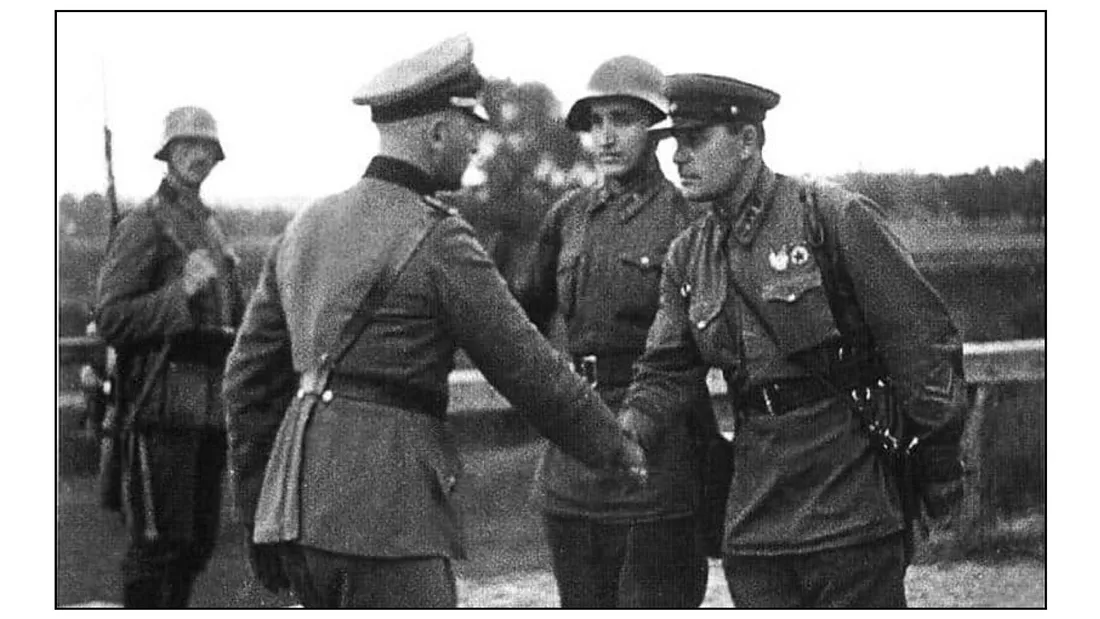
In addition to the propaganda narratives, polls, TV segments, and symbols venerating Stalin, a new website, Stalinline.ru, was created a couple of months ago. The site archive, which stretches back to December 2018, includes no information on the site’s creators or mission. The first post on the webpage is dated December 13, 2018, suggesting that the site had not been active prior to that month.
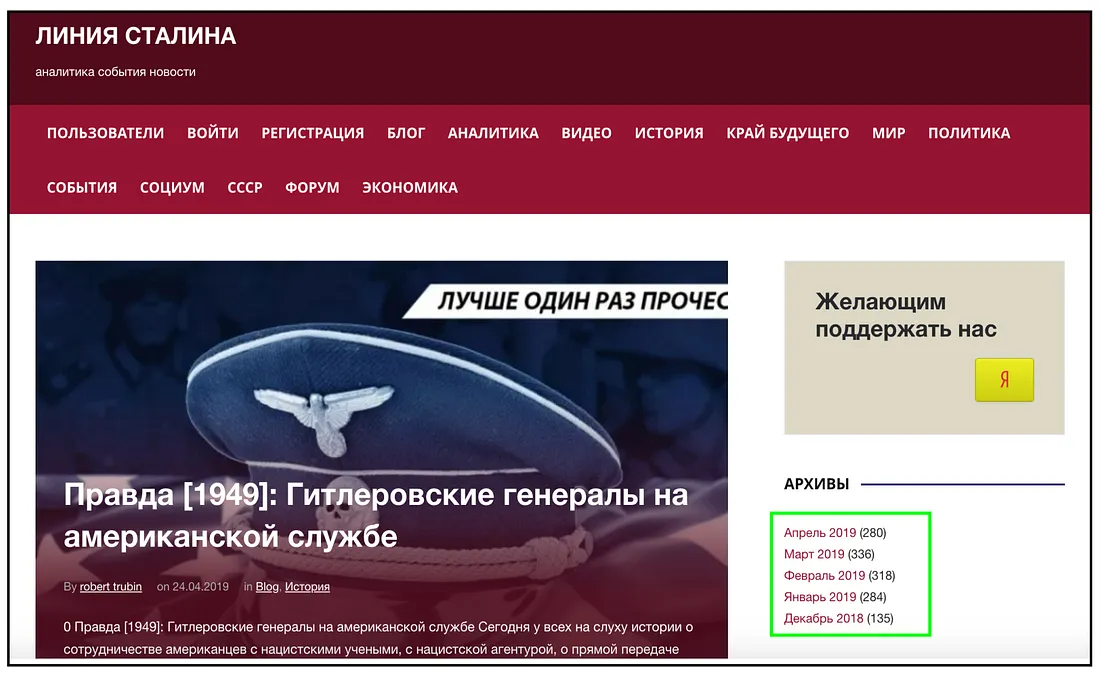
The sections of the webpage included “USSR,” “Economy,” “History,” “The Edge of Future,” “Forum,” and many others. Overall, the content on the site propagated biased narratives in favor of Stalin. It also cultivated a sense of nostalgia for the USSR, characterizing the Soviet era as a prosperous period. The number of articles published by Stalinline.ru fluctuated between 280–320 per month.
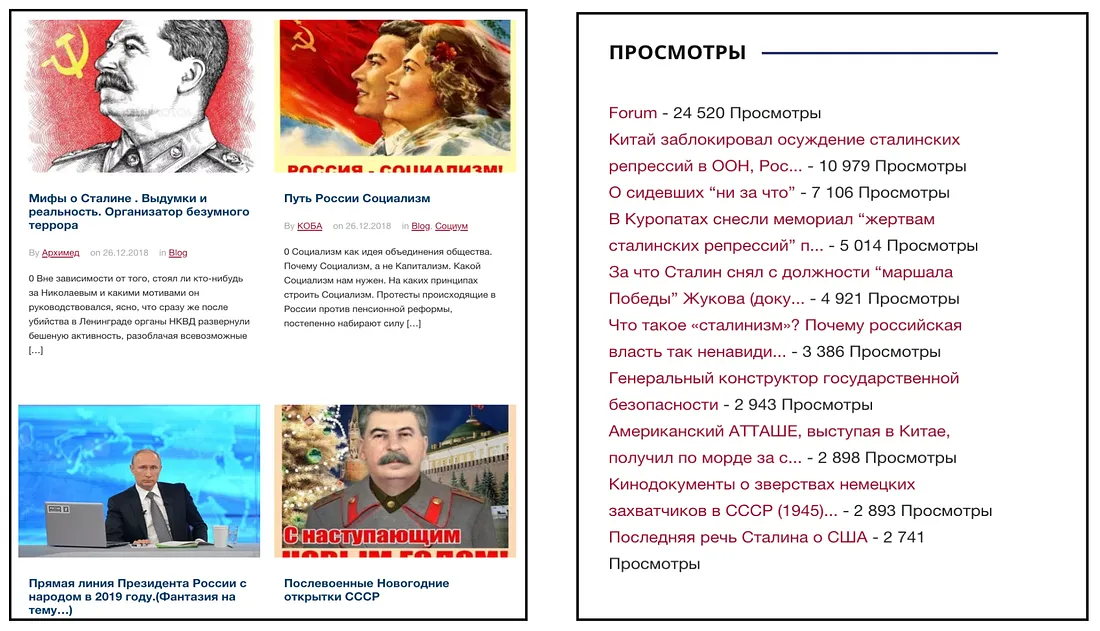
Mention Intensity of Stalin on Online Platforms
Using the online analytics tool Sysomos, the DFRLab scanned for mentions of the word “Stalin” among online platforms in both English and Russian between March 28 and April 26, 2019. Sysomos registered 72,529 mentions of the word “Stalin” (Сталин) in Russian across all platforms. Daily mentions of the word “Stalin” was low throughout the first half of the observed period but reached a peak on April 16 — the day the Levada Center polls on Stalin were released — and remained high relative to the first half of April.

Sysomos registered 430,874 mentions of the word “Stalin” in English across all platforms. Daily mentions of the word fluctuated during the observed period before peaking on April 16, 2019.

Conclusion
The Kremlin has been expending energy and resources to rehabilitate Stalin’s image for almost two decades, while downplaying the atrocities he facilitated. In part to legitimize the Putin regime’s behavior, the Kremlin continues to rehabilitate the Soviet dictator’s reputation — possibly to stoke patriotic fervor that distracts from its corruption and incompetence. Its efforts appear to be working.
Register for the DFRLab’s upcoming 360/OS summit, to be held in London on June 20–21. Join us for two days of interactive sessions and join a growing network of #DigitalSherlocks fighting for facts worldwide!

